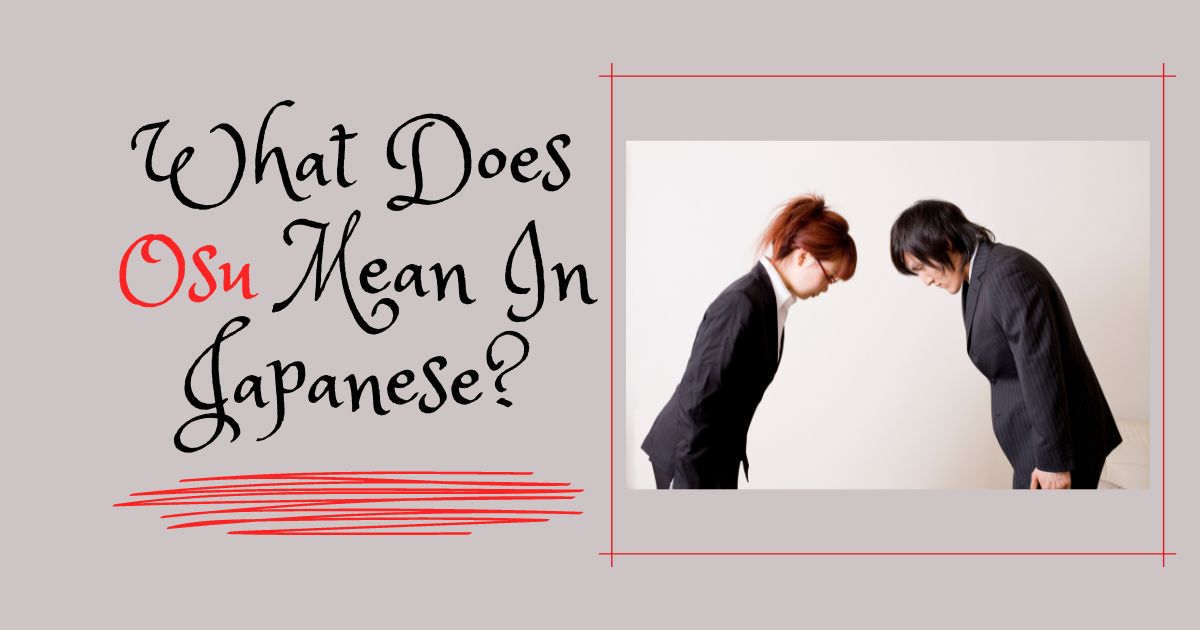What Does Osu Mean in Japanese?
Osu is a Japanese word that you can write as “Osu,” “Oss,” “Ooss,” and all are correct. So, what does Osu mean in Japanese? Well, it is one of those expressions that you can use for almost anything! Sounds incredible, right?
Not so fast! Osu is not an all-purpose word that you can use with your Dojo comrades haphazardly. If you do this, you will get it terribly wrong! So you must understand its meaning and application before using it.
Pronounced “Oss,” the use of the term Osu has grown exponentially over the years, mainly because of anime. The word is dynamic, but many people misunderstand it. They use it primarily to affirm, greet, empathize and respect.
You will find people using the term mainly in martial-art classes, group chats, and laundry stores in different contexts. To understand this Japanese expression better, there are several aspects we have to look at.
For instance, where it comes from when to use it, why people use it for virtually everything, and the times you should never use it! Let’s dig in.

The History and Origins of Osu
There exists a lot of confusion on the proper usage, pronunciation, and origin of this term. According to history books, they first used “Osu” at the beginning of the 20th century. However, historians also believe that its origin is the Officers’ Academy of the Imperial Japanese Army.
Therefore, this means that the term “Osu” does not originate from the birthplace of Karate. As a result, there are numerous theories regarding the meaning and origin of the term. For example:
The Kyokushin Karate Hypothesis
According to this supposition, the term “Osu” is a condensation of two words – “Oshi” and “Shinobu.” The two Kanji’s origin is the longer-term “Osu no Seishin.”
Here, “Osu” is a verb that means “Push” while “Shinobu” connotes “to endure.”
When you put these two Kanjis together, they form a new complex word representing “combat character.” It also means not demonstrating distress or fatigue,” “the necessity to conquer all difficulties by pushing them aside,” or “making headway with a stable optimistic perspective.”
It also implies the mentality you should carry when training for Kyokushin Karate. Osu represents a basic philosophy of Kyokushin Karate – to hold on when your opponent is pushing you.
The theory also claims that you recall tolerance, perseverance, determination, and positivity every time you say “Osu!” to yourself.
The “Ohayo Gozaimasu” Hypothesis
Dr. Mizutani Osamu is the originator of this hypothesis. The good doctor was a language connoisseur and linguistics professor at the University of Nagoya, Japan. Moreover, he is the author of the book “Japanese: The Spoken Language in Japanese Life.”
In the book, he discusses an experiment with people in returning greetings. He concludes that the term is related to a proper expression, “Ohayo gozaimasu.” Note that “Ohayo gozaimasu” is a gracious way of saying “Good Morning.”
Dr. Mizutani conducted research with a random group of people. He observed how different individuals responded to the good morning greeting during the experiment.
In short, he greeted strangers on the streets of Nagoya using the expression “Ohayo gozaimasu!” and recorded their responses. Most people responded in the same way (“Ohayo gozaimasu!”)
However, he also noticed that the greeting differed based on the situation. For example, people involved in athletic activity would respond in a considerably rough language than those just strolling.
Dr. Mizani noted that most joggers responded in shorter forms such as “Ohayossu!”, “Ohayoosu!” “Oossu!” or just “Osu!”
On the other hand, Dr. Osamu also suggested that “Osu” could be an unkind expression commonly used among males. In this sense, it means “Hey ya!” in English.

The “Friendlier Onegaishimasu” Hypothesis
This is how you pronounce “Onegaishimasu” – “oh-nay-guy-she-mus.”
This presumption is somewhat analogous to the “Ohayo gozaimasu” theory. It suggests that “Osu” is an abbreviation of “Onegaishimasu.” You can interpret it in various ways, including “please look after me.” besides that, you can also interpret it as “please have patience with me.”
But how did “Onegaishimasu” become “Osu?” Well, regular students in Dojos yell “Onegaishimasu” as they bow to each other before starting their exercises. However, several youngsters gradually shortened the expression. In the end, the word became “Osu!”
Additionally, “Osu” is a crucial term within Dojos of Japan. You use it when you need help from your instructor or senior. It is characteristically a courteous way of saying “please.” In some instances, Karate students use Osu as a more civilized way of saying Onegaishimasu.
With these theories in mind, there are several ways you can apply this Japanese term. However, there are also specific ways in which you cannot and must never use Osu. Please read the following sections for more details.
When NOT to Use the Word Osu
By now, you know that you can use Osu to show respect to your elder in a Dojo. On the flip side, the Japanese perceive it differently. With that in mind, you need to know when never to use this term to avoid rubbing people the wrong way.
Here are the different circumstances when you must never use “Osu” to a Japanese person:
- First, never use the term to someone except if they are younger than you.
- Second, never say “Oss” to someone except if they are of a lower rank than you.
- Third, never say “Osu” to a woman or never use the term if you are a woman.
- Fourth, never use the expression except if someone wants you to say it.
- Finally, don’t use the term as the prefix and suffix of everything you say.
To avoid embarrassing yourself by misusing the term “Osu,” consider using “Hai.” Hai is a typical Japanese term that translates to “understood,” “yes,” or “affirmative.” However, it is not a criminal offense to misuse Osu.
Nonetheless, ensure you use it with a complete understanding of the meaning and implication. Also, only use it when you feel you can back it.
The RIGHT Way of Using Oss/Osu
Now that you know when not to use Osu in your conversations, it is time to learn how to apply it.
Below are some of the contexts in which you can apply Osu:
- Greeting: You can use Osu to salute and recognize someone respectfully. Usually, in various martial art Dojos, students bow to their masters or trainers while saying “Oss.” They do this at the beginning and the end of the lessons.
- Response: You can use Osu as a response. For example, when you say Osu after your instructor shows a technique, it means you are affirming you have understood it. Here you use Osu to indicate “Yes” or “I Understand.”
- You can also use “Osu” to demonstrate respect while bowing down towards a mat during a match or practice. Additionally, you can say it to respond to the referee when he asks you if you are ready.
What is the Significance of Osu in Karate?
Kyokushin Karate training is usually painstaking and challenging. Therefore, you must be patient, hard-working, and determined to develop a resilient mind, body, and spirit.
At some point, you will feel like giving up when you are running low on morale. In this regard, the Kyokushin Philosophy teaches you to hold yourself and remain strong when your enemy is pushing you.
You can draw parallels between Osu’s literal meaning and Kyokushin’s Philosophy. Osu is a significant expression in Kyokushin because it encourages you to remain tolerant, persistent, and optimistic.

TKO!
What does Osu mean? Osu can have several meanings. You can use it as a polite good morning or demonstrate respect. Moreover, you can use it to remind yourself of the power you wield. Therefore, you can use it any way you want.
However, please ensure that you don’t trigger someone else’s values whenever you use it. As long as you remain conscious of the Kyokushin karate hypothesis, you are good to go! Read our article and find out Japanese Martial Arts With Swords.

